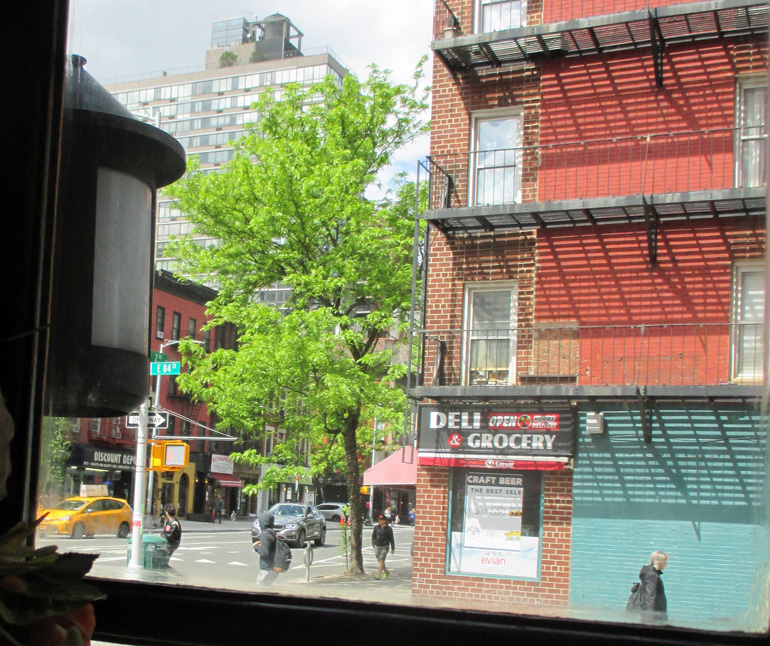Gotham Diary:
Means of Production
May 2017 (IV)
Monday, May 22nd, 2017
22, 23, 25 and 26 May
Monday 22nd
When I was an undergraduate, someone told me that Cardinal Newman used to read Mansfield Park every summer. I was very impressed by this nugget of complex information, every part of which illuminated every other and increased the brilliance of the whole. I exaggerated the unusualness of a cardinal‘s reading novels; I knew that Newman was a convert, but I didn’t quite understand what it meant that he had started out as an English gentleman. Nevertheless, the anecdote was said of Cardinal Newman, bringing the force of a mature man’s wisdom. The anecdote suggested, moreover, that Jane Austen was singled out among all novelists for revisiting. That Cardinal Newman chose the singular unfunny title in Austen’s oeuvre, the most serious and religious-minded of her books, had the effect of transforming — transfiguring, really — the story of Fanny Price into a sort of seasonal devotion, a book of hours for long summer afternoons.
It was the ritual aspect that appealed to me, the faithful re-reading year after year, presumably in the same month, perhaps even in the same place. I will never live up to it. I have a hard-enough time remembering to listen to Bach’s Passions during Lent; for some reason, I much prefer them in the late autumn. I happen to be reading Mansfield Park at the moment, not in imitation of Newman’s example but pursuant to a more stunt-like plan: I am reading Austen in reverse. About a month ago, I gave up looking for new things to read on the Kindle, and started in on Persuasion. As I came to the end of it, I had the idea of reading Mansfield Park, and then Emma (which has always been my favorite), followed by the two antithetically-titled chestnuts. It would be perverse not to finish with Northanger Abbey. Perhaps I might go all the way and read Lady Susan for the second time. Will Austen’s greatness palpably diminish? If it does, I shall relish the satisfactions of the connoisseur. It’s always fun to play the pompous ass — as long as nobody is looking.
Mansfield Park has struck me in the past as unusually shapeless, a series of one damn thing after another. No sooner does Fanny Price arrives at Mansfield Park than Sir Thomas disappears to Antigua. Aunt Norris — the noisiest of wicked witches — arranges the Rushworth alliance, and the Crawfords arrive at the Parsonage. These developments swell into the embarrassing afternoon at Sotherton, the dull Mr Rushworth’s great house. Then, Tom Bertram, having been sent back to England ahead of his father (one needn’t wonder why), shows up with a new friend picked up at the races (or is it Weymouth?), and, next thing you know, Aunt Norris is fashioning a curtain for the “theatricals,” an amateur production of the sentimental but decidedly inappropriate play, Lovers’ Vows. Which never takes place, of course, because Sir Thomas shows up unexpectedly and puts a stop to it. Now the pace slows a bit, as if in respect of the unwise nuptials. With Maria and Julia off the scene, Fanny emerges as a pretty, if still quite timid, young woman. The occasion of her naval brother’s visit inspires Sir Thomas to give a ball at Mansfield, and Fanny shines — in her understated way.
Through all of this, there has been no sense of an impending crisis, of something that will happen and change everything. In Persuasion, we know from the start that Anne Elliot and Captain Wentworth will have to come to some sort of terms, now that their lives have been thrown together again. In Emma, there is the immediate drama of snaring Mr Elton for Harriet Smith; this is followed by the murky interactions with Emma of Frank Churchill and Jane Fairfax. In Pride and Prejudice, each of the Bennett girls seems to have her own impending crisis. But there is no early indication in Mansfield Park of a matter that must be settled. Rather, it appears that poor Fanny will just have to get used to Edmund’s eventually marrying someone else — for she can’t bring herself to expect that he will marry her, even if that is her heart’s desire. Not until the shocking chapter in which Henry Crawford boasts to his sister that he intends to leave “a small hole” in Fanny’s heart by making her love him does the crisis of Mansfield Park announce itself. And even then, Fanny cannot take it seriously. She loathes Crawford, and expects to bat him away with unwelcoming speeches. But these only excite him.
Mansfield Park is not shapeless at all: it is insidious. Step by step, Austen takes us into the nightmare garden of old-world libertinage. Henry Crawford is every bit the monster of depravity that Fanny takes him to be, but only she sees the devil behind the disguise. She does not see him with complete clarity. Aside from failing to realize that her discouragement is an aphrodisiac, she never quite grasps the grotesque impropriety of Crawford’s arranging for William’s advancement before opening his heart, or whatever simulacrum thereof he possesses, to Fanny. He saddles her with a heavy burden of gratitude that makes her rejection of his suit seem churlish. She senses it and she regrets it, but she doesn’t understand the mastery of his pinning maneuver. She would have to be older — Anne Elliot’s age — to examine Crawford with complete analytical detachment. Fanny simply wants him to go away. Exposing a virtuous maiden to the depravities of a perverted lover is one of the oldest thrills in storytelling, and Austen intensifies its horror by presenting it in a context of gracious good breeding. Everyone surrounding Fanny seems willing to regard Crawford’s pursuit of her as proof that he wants only her inspiration to repair the tarnish on his character. Even Edmund is willing to offer her up. In his “dignified musings,” Sir Thomas concludes that the best thing for Fanny is a taste of the shabby-genteel life from which he and Aunt Norris pulled her as a child. I want to save talking about Austen’s magnificent handling of this episode, which sinks the penitential in the transcendent, until I’ve read it again. But it is hard to give one’s complete attention to these humble scenes, knowing as one does of the explosion a-building in the background.
***
Tuesday 23rd
Good thing I decided to read the end of Mansfield Park before writing about it. “Sinks the penitential in the transcendent,” eh? On top of being wrong, it’s contradictory, for things can’t sink while they’re transcending, can they now? And it is wrong. I had it all backwards. The Fanny-in-Portsmouth episode of Mansfield Park shows Austen at her most Thatcherite. Fanny does not overcome initial misgivings to reach a greater understanding of her parents. On the contrary, she is rudely awakened from dreams of “home” and parental attachment to “bad smells,” to a father who is “dirty and gross,” and to a mother who is “a slattern.” There is nothing transcendent in this. Fanny cannot wait to leave. Scrupulous at first about referring to Mansfield Park by its name, by its county, she soon falls back on calling it home, and the shocking thing is that her parents are not offended. They have been discharged of her, and her departure gives them greater joy by relieving them of Fanny’s sister Susan. Austen has no sympathy for the Prices; as she paints them, they wouldn’t want it. They have made their soiled and pointless ways all by themselves. Mrs Price especially is not to be forgiven her imprudent marriage. The Portsmouth episode comports with the overall mixed message of the book, which is that poor people must take personal responsibility for their situations, while upper-class miscreants are discreetly translated to that era’s equivalent of a witness protection program. A hypocrite reader, I loved every minute.
And Sir Thomas’s “dignified musings” were on the ball, too; I was wrong about that. Against the backdrop of her parents’ shabbiness, Henry Crawford, when he pays his visit, is more attractive to Fanny than ever, and she is quite softened in her regard for him. Who knows what a few more visits might have done? Certainly Crawford’s subsequent folly with Mrs Rushworth cannot be accounted as a rebound; he must have known that his stock with Fanny stood higher than ever. The situation is saved by Crawford’s vanity, not by Fanny’s caution.
When Edmund and Fanny discuss the moral vacancy of Mary Crawford’s reaction to the scandal, Austen astutely avoids religious references. She leaves all of that to the reader, giving leave to the reader who is not religiously inclined to regard the novel’s judgment as purely humane. It may have been unwise of Maria Bertram to marry Mr Rushworth, but having done so, she is obliged to bear with him; she is even more obliged not to insult him by deserting him, and herself by yielding to foolish passion. Crawford is all the worse for having permitted Maria to destroy her respectability without feeling any love in return. Mary Crawford regards it all as “folly,” and so might we, but Austen insists that we see it as outright wrong. We must understand that life is big enough for Fanny, who benefits in every way from the disgrace, nonetheless grieves — even if somewhat abstractly.
I was also mistaken in thinking that Mansfield Park was written after Emma, not before it. So much for my project of reading the novels in reverse. Not that I’ll abandon the reading — I’ve already returned to Hartfield and Highbury, and witnessed the cruel abduction of Miss Taylor.
***
Over the weekend, I watched Contact, and for the oddest reason. The night before, I had really enjoyed The Silence of the Lambs, which I hadn’t seen in a long time. I was struck by Jodie Foster’s ability to incorporate Masha Skorobogatov’s performance as Clarice Starling’s younger self, despite the fact that the two actresses bore no mutual resemblance whatever. I remembered Foster’s doing the same thing in Contact, her brightening eyes recapitulating Jena Malone’s earnestness at the ham radio setup. This is how one thing leads to another in my life. (I also watched Broadcast News again, because Holly Hunter does such an amazing job of showing how little Gennie James grew up.)
There is one line in Contact that has stuck with me, as an abiding thought if not as a literary motto. Astronomer Eleanor Arroway (Jodie Foster) is asked by the member of a selection committee to state the one question that she would be certain to ask if she encountered intelligent life. “How did you do it?” Arroway replies. “How did you evolve, how did you survive this technological adolescence without destroying yourself?”
How are we going to survive it? That humanity has been plunged into something at least as unsettling as adolescence is more obvious every day. Leaders at every level are showing themselves to resemble teenagers with poor judgment driving cars after parties. An apparently endless string of bribery charges ties up officials the world over. Why did they think they could get away with it, especially in this era of ubiquitous cameras and flashpoint news updates? It is hard to tell whether the art of keeping secrets has been lost or become impossible. There are few signs that anyone is learning to live with conditions as they are. I have always suspected that societies will not regain their balance until all the people who grew up before the new technology is properly understood have died off. That might sound like a eulogy for the Baby Boomers. But “all the people” may include everybody alive today, and yet to be born for many years. The proper understanding of technology is nowhere in sight.
The current state of play is an allergy to strangers. Technology has done just the opposite of what it was expected to do in the postwar years. It has put us all in the same space without bringing us together. The human penchant for blaming the unknown for everything that’s wrong has been given too many opportunities. We blame other people, instead of re-examining social arrangements that haven’t caught up.
In the United States, it often seems that two distinct societies are finding it difficult to establish condominium. The pairs vary: the Coasts and the Heartland, the Urban and the Rural. I wonder, though, if it is not a matter of the same society in two phases — an old American story with a history of ugliness. When immigration was overwhelmingly Northern European, established Americans discriminated against those with strange accents or foreign tongues. Then, as Southern Europeans appeared, skin color became the shibboleth. Now, of course, it is Islam that distinguishes those who are pursuing the American dream from those who feel that they have achieved it, and that somebody is trying to take it away from them.
In the past, the problem could be solved geographically, but our landmass is settled now; nobody wants to live in the empty places. Our cities suggest that we could create more territory for groups by living more densely — something that would also solve a number of environmental problems. But who is to lead this move? Where are the adults?
***
Thursday 25th
All week, I’ve been mulling over something that I read via The Browser on Tuesday. It’s an interview with Israeli linguist Daniel Dor that I urge you to read, partly because I’ve probably misunderstood it, but mostly because I am not going to discuss it in terms of linguistic theories generally. All that I’ll say about that larger landscape is that the response of linguists such as Noam Chomsky and Steven Pinker to the Sapir-Whorf hypothesis (different languages provoke different thoughts) strikes me as intellectually boorish, the equivalent of arguing that the quartets of Haydn and Mozart “sound the same.” Having said that, I am going to continue as if no one had ever proposed a theory about the origin of language before.
Daniel Dor, working with others, especially Eva Jablonky, speculates that language was invented by ancestors of Homo sapiens sapiens, as a response to necessities occasioned by “complex dynamics at the collective level.” I unpack that bit of mumbo-jumbo to mean that our ancestors were forming groups that required the kind of language that only human beings speak. Dor points out that all other languages that we know of are limited to the description of and commentary upon the here-and-now. Neither chimpanzees nor other animals are capable of communicating information about yesterday, much less planning for tomorrow. Another way to put this is that non-human languages cannot intelligibly articulate experiences that are peculiar to only one of two participants in a conversation.
In the interview, Dor does not come out and say what comes next, so you’ll have evaluate my inference for yourself. My inference is that he and his colleagues speculate that the newly-invented language wasn’t very effective. I would say that what was invented wasn’t the language so much as the need for the language. Dor continues, “language began to function as a selective environment for individuals.” More mumbo-jumbo, but I think it means that the ability to speak the new language became a factor in either natural or sexual selection. Those who had it did better than those who lacked it. “Eventually, Homo sapiens emerged as a language-ready species.” What this means, I think, is that the possession of all the capacities required for effective speech (tongue, windpipe, brain) became basic human equipment. (Dor is eager to insist that language itself is not part of our genetic inheritance. The ability to speak and understand it is what’s passed down.)
As you can see from my inferences and clarifications, I’ve already customized Dor’s hypothesis to my own way of thinking. This morning, it occurred to me to present an instance of the human dynamic underlying Dor’s theory in an entirely different, and far more familiar context. Let’s say —
Let’s say this: Henry Ford, in inventing the assembly line (which he didn’t, not really, but we’ll let that pass; he deserves the credit for running all the way with a good idea), also invented the need for robots. The assembly line itself was already partly robotic — the conveyors that moved parts from station to station until a car was assembled were mechanical. The assembly itself was performed by workmen, but from the moment the conveyors were activated it was probably inevitable that more and more of the assembly process would be performed by mechanisms invented for the purpose. Now, of course, cars can be manufactured with very little direct human action. Whether they are or not is a political and economic question, but it is not a technological question. The technology of automated automobile assembly is in place.
To map Dor’s hypothesis over Ford’s experience, we can appreciate the difference between Ford’s assembly line and today’s. The automated assembly line has solved all of the problems inherent in depending upon a workforce made up of different human beings. Individual idiosyncrasies, desires for wage increases and other benefits, hostility to management: these are all vaporized by automation, on top of which, robots can be repaired by robots! Now, language has created vast human riches, but I think that it would be wrong to say that it has solved all the problems that people have in trying to communicate with each other. But I have made the comparison not only to translate Dor’s theory into Common Reader, but also to highlight a distinction that is both essential to constructive thinking about our future and woefully lacking in the unspoken prejudices and predispositions that govern what we say about it.
***
I have more to say about Dor, but right now, with the assembly line fresh in mind, I want to pursue the distinction between the human and the mechanical.
Mechanisms are systems or devices that perform pre-determined operations in a highly predictable manner. Variables such as speed and input can be simply controlled by levers and switches. Most mechanisms perform one of two functions. Some mechanisms perform highly-repetitive and/or intensely precise operations. Others perform operations that require energy and durability beyond the capacities of humans or animals. Some mechanisms, such as an airplane, perform both functions. Flight itself is an example of the second function, while the firing of spark plugs in the plane’s engine is an example of the first.
It could be argued that the animal body is full of mechanisms, but I have tried to capture the unhelpfulness of this argument in my definition. The predictability of bodily functions is too complicated to be “highly predictable”; there is still much to be understood about them. Nor can bodily functions be controlled simply. How wonderful it would be if our metabolisms could be switched, without adverse consequences, to produce the loss of ten pounds! Still, the mushrooming expansion of mechanical devices in the past two centuries and more has generated repeated campaigns, more or less overt, to treat human beings as mechanisms. Ford’s assembly line is of course a prime example, and it is also an example of dissatisfaction with such a campaign: eventually, the problem of the assembly line was solved not by making human beings more mechanical but by replacing human beings with actual mechanisms (robots). Manufacturers are ahead of everyone else on this. The very concept of “productivity” is an example of the persistent desire to treat human beings as machines. And while it may make sense to harness mechanisms in the production of manufactures, perhaps it also makes sense to stop assessing other human work by assembly-line standards.
It may be, in short, that the vast mechanization that we call the Industrial Revolution invented the need for a humane economics. One that has nothing at all to do with the means of production!
***
Friday 26th
Something else that occurred to me, while I was trying to take in Daniel Dor’s hypothesis about the origin of language, was that it serves as a template for the explanation of a lot of human frustration and suffering. We are all gifted with the ability to imagine a better world. What we have yet to develop — call it a need that hasn’t been met, just as “language-ready” human beings (according to the hypothesis) took a while to develop after the invention of language — is the body of knowledge that would tell us when to work toward our goals and when to wait. Planting a lovely garden involves an amazing amount of idleness: most of the time, there is nothing to do, and you have to learn how to leave it alone.
My current bugbear is “perfection.” I should like to see this notion drop-kicked out of the solar system. It is yet another bad idea from the Greek cornucopia. All it does is reify frustration. The idea of perfection proposes that our improved dreamworlds actually exist, if only in the superlunary world of form. The idea is that if you can imagine something, it’s real, even if its reality is not currently available on Earth.
From the pagan idea of perfection, the Christian Doctors created a metaphysics, without Scriptural support of any kind, that explained human shortcomings as imperfection. Our imperfection was explained as the price of our First Parents’ great sin. Since Genesis has nothing to say about the thoughts that Adam and Eve may have had about perfection as such, it’s unclear whether eating the apple stripped them of perfection or made them aware of their lack of it — an interesting point, if you go in for angels dancing on pinheads. The idea of human imperfection has permeated Western thought and is no longer tethered to religious thought. The Enlightenment, for example, is often faulted for having assumed the perfectibility of man, something that led straight to Totalitarianism. I believe that this is a misreading of the philosophes, as long as you exclude that hypocritical troublemaker, Rousseau.
The fact is, we are who we are. We are state of the art human beings. We could all do better. There are good reasons why we don’t. The things that keep us from doing better are not imperfections. They are features; aside from illness, there are no bugs. “Weakness” signals the impossibility, however momentary or long-lasting, to resolve conflicting objectives. Evil — I have thought a lot about evil lately and I have located it not in individuals (sociopaths are sick) as among them: evil is a matter of conspiracy. More about that some other time. To sin is to yield to an unwise or shameful impulse, almost always because of a “weakness.” The cure for weakness is not disciplined virtue but knowledge. Some of this knowledge, we already possess. Most of it, we don’t, not yet.
Another implication of Dor’s hypothesis is that the line between the group and the individual is unclear, and possibly nonexistent. Like “perfection,” the distinction is something that we can imagine, although it may have no correlative existence. We are responsible for our actions, but we are also responsible for helping others, and even more for not making the lives of others more difficult than they already are, something very easy to do if you’re a libertarian. I understand the libertarian critique of “government,” and it has nothing to do with the problems of people trying to constitute a society. It seems clear that we did not develop language for libertarian purposes. In fact, it would seem that the honest libertarian’s first duty is to shut up.
***
I’m taking next week off. I hope to have a very good time.
Bon week-end à tous!
.




